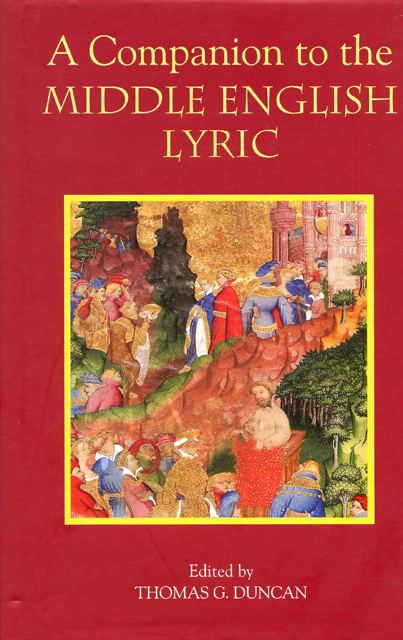Book contents
- Frontmatter
- Contents
- Acknowledgements
- Abbreviations
- Editorial Note
- Introduction
- 1 Middle English Lyrics and Manuscripts
- 2 Middle English Lyrics: Metre and Editorial Practice
- 3 The Love Lyric before Chaucer
- 4 Moral and Penitential Lyrics
- 5 Middle English Religious Lyrics
- 6 Middle English Courtly Lyrics: Chaucer to Henry VIII
- 7 The Middle English Carol
- 8 Political Lyrics
- 9 The Lyric in the Sermon
- 10 ‘Cuius Contrarium’: Middle English Popular Lyrics
- 11 Gender and Voice in Middle English Religious Lyrics
- 12 Lyrics in Middle Scots
- Bibliography of works cited
- Index of Manuscripts Cited
- General Index
- Index of Lyrics
2 - Middle English Lyrics: Metre and Editorial Practice
Published online by Cambridge University Press: 23 March 2023
- Frontmatter
- Contents
- Acknowledgements
- Abbreviations
- Editorial Note
- Introduction
- 1 Middle English Lyrics and Manuscripts
- 2 Middle English Lyrics: Metre and Editorial Practice
- 3 The Love Lyric before Chaucer
- 4 Moral and Penitential Lyrics
- 5 Middle English Religious Lyrics
- 6 Middle English Courtly Lyrics: Chaucer to Henry VIII
- 7 The Middle English Carol
- 8 Political Lyrics
- 9 The Lyric in the Sermon
- 10 ‘Cuius Contrarium’: Middle English Popular Lyrics
- 11 Gender and Voice in Middle English Religious Lyrics
- 12 Lyrics in Middle Scots
- Bibliography of works cited
- Index of Manuscripts Cited
- General Index
- Index of Lyrics
Summary
How are Middle English lyrics to be read? In the Middle Ages many would have been sung: some survive with music. But others (whether originally set to music or not) would have been read, probably read aloud, and, by informed readers at least,with a sense of the movement of the verse – a crucial aspect of lyric form. It is likewise essential that present-day readers should have some understanding of lyric metre if they are to enjoy these poems to the full. More often than not, however, metre is a topic passed over in silence in editions and anthologies of Middle English lyrics. The question of how Middle English lyrics should be read goes hand in hand with the question of how they should be edited. As E. T. Donaldson has observed of Chaucer, ‘it is impossible to edit at all without having in mind some fairly strong preconception concerning … metre’ (Donaldson 1974, 99).
Metre
A commonly accepted view has been that lyric scansion is appropriately to be analysed in terms of the number of stresses per line. Representative of this view is G. L. Brook, the editor of the standard edition of the Harley lyrics. According to Brook, stressed and unstressed syllables ‘alternate fairly evenly as in Modern English versification’. Nevertheless, some lines have ‘fewer stresses than we should expect’; and although Brook accepts that ‘some of these lines may be corrupt’, he takes the view that it is ‘better to regard the occasional substitution of a three-stress for a four-stress line as a form of licence to avoid monotony’ (Brook, 18). However, such an account of metre involves several assumptions. One is that the medieval reader entertained the same aesthetic responses as a modern reader. Yet, would a Middle English reader or poet necessarily have felt or shared Brook's (or any modern reader’s) notion of ‘monotony’? If anything, the evidence tells against any such view. Thus, it seems gratuitous to assume that in a poem so carefully crafted as the Harley lyric Weping hath myn wonges wet (Duncan MEL, No. 27), where each stanza concludes with a quatrain of ‘three-stress’ lines, that one line (59) out of 24 such lines should, ‘to avoid monotony’, happen to be a ‘four-stress’ line.
- Type
- Chapter
- Information
- A Companion to the Middle English Lyric , pp. 19 - 38Publisher: Boydell & BrewerPrint publication year: 2005
- 1
- Cited by



